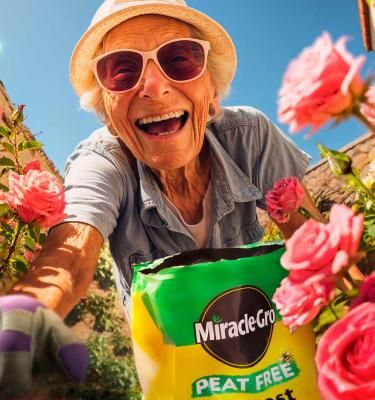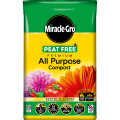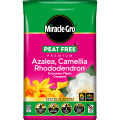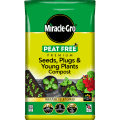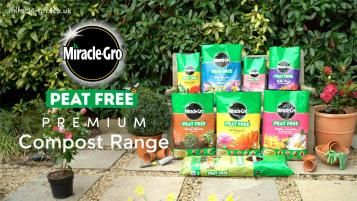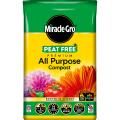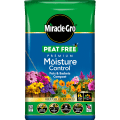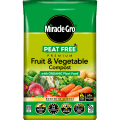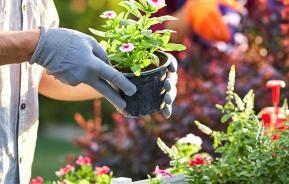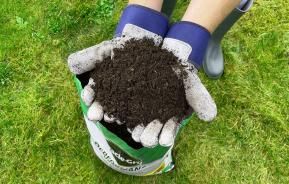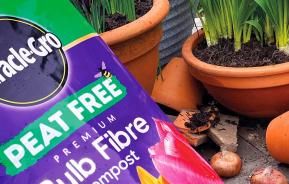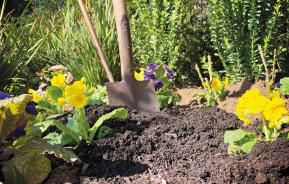Growing successfully all starts with good soil – but not all peat-free compost is created equal. Miracle-Gro offers a wide range of peat-free composts to help keep many different types of plants healthy and strong for seasons to come.
However, as extracting peat to use in peat-based compost has a detrimental effect on the environment, Miracle-Gro has worked for over 30 years to come up with an alternative. After lots of research and development, Miracle-Gro has gone peat-free and we can proudly share that our compost is as good – if not better – than traditional peat-based composts. Which means you can enjoy yet another Miracle-Gro ‘Gro-ment’ for doing your bit for the environment.
Miracle-Gro has perfected its recipes for composts, so you can rest assured that you’re buying a top-quality product that will give you the best results.
What’s more, Miracle-Gro has a comprehensive range of peat-free composts, each tailored to specific uses. Choose from all-purpose compost, which provides optimum structure for roots to grow strong; moisture-control compost for your pots and baskets; and fruit and vegetable compost, which includes organic plant food.
Use Miracle-Gro’s peat-free compost and you’ll have a garden filled with vibrant, happy plants and a well-stocked veg patch, so you can enjoy those extra-special ‘Gro-ments’.
What is peat-free compost?
For over 50 years buying a bag of compost to use in your garden, whether planting up pots and containers, planting in the border, or for using in your veg garden, the key ingredient in the bag was peat. Peat has been extracted from peatlands for many years for the horticulture industry. Peat provides excellent water-retaining qualities, has a lovely open texture for roots, and tends to be free from pests and disease. Until fairly recently, the importance of peatlands was not fully realised but now, we know how important these lands are not only on an environmental level by acting as a carbon sink but also to protecting biodiversity.
From 2024 it is recommended that the home gardener should no longer be able to buy peat-based compost, some manufacturers and retailers have already made the transition, not waiting for government legislation but because it is the right action to take. However, it is evident that not all peat free composts are equal in terms of performance, so how do you know whether you are buying the right compost that will give you the best results.
Compost manufacturers have spent many years researching the best ingredients to replace peat. The horticultural scientists at Miracle-Gro have led the way spending over 30 years researching, developing, and investing in alternative ingredients to peat making sure that the transition to peat-free composts is as smooth as possible for all gardeners. So, what makes peat free composts so different? Well, the mix is very different with more ingredients, here are some of the key ingredients:
- Wood-based materials – these include woodfibre, composted bark, and bark chip. These materials provide excellent drainage properties and allow air to pass through the roots enabling healthier growth. Some wood-based products can deplete the soil of nitrogen, which is essential for plants to thrive, however Miracle-Gro’s unique nitrogen-infused “woodfibre” ensures no leaching of nutrients occurs.
- Green composts – this material comes from garden waste bins and is collected and composted on a very large scale. Historically there has been some issues of contamination with plastics and glass being found in bags. However, Miracle-Gro’s green compost is screened to an extremely high standard to ensure it is as clean as possible and has passed an industry quality standard PAS100, which provides extra reassurance that it is a quality product, free from contaminants. Green composts have a high nutrient content so are good for your plants. However, to get the right balance of nutrients they do need to be mixed with other ingredients.
- Coir - is a waste product of the coconut fibre industry put to good use. It has excellent water-retention properties perfect for your plants.
- Other Ingredients – bracken, sheep's wool, arable straw waste, and anaerobic digestate are all ingredients used in peat-free composts. Some of these ingredients however are limited, and can be costly, and performance variable.
Look and feel
One of the key differences between peat-based and peat-free composts is the look and feel.
Peat-free alternatives tend to have a more open, coarse, and fibrous structure making the mix feel slightly less fine in texture. Compost with natural wood-based materials such as wood fibre and composted bark look and feel more ‘bitty’, but these pieces of wood-based materials mustn't be removed as they are a vital part of the ingredients that go into making peat-free compost as good, if not better, than peat-based.
Peat-free composts can be lighter in colour, especially coir-based products, although most bags with green compost added will still be dark.
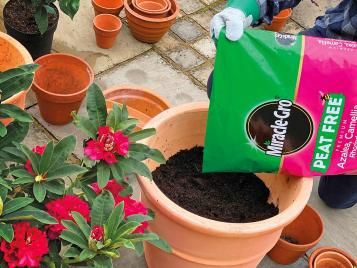
All these ingredients can be likened to baking the perfect fruit cake which, by nature, requires many different ingredients - you wouldn’t take out the fruit because it compromises the cake and makes it look lumpy. So, Miracle-Gro’s peat-free compost is composed of carefully measured ingredients that all combine to give the best results, so like a fruit cake, don’t take out the ‘bits’ as this will compromise the final result.
The advantage of buying bagged composts is that they are premixed and ready to use, with the right balance of nutrients. You don’t need to add in any grit or other ingredients.
How to use peat-free
With the different composition of peat alternatives comes a slightly different way of growing with it. This different composition does not mean that peat-free is inferior just that there are a few steps you need to be aware of to make sure your garden thrives.
Watering - Some peat-free composts may not hold on to moisture in the same way that peat-based composts do so it’s really important to get to know your plants. Follow these tips below to make sure you have healthy, happy plants.
- Get to know how your container or pot looks when you water it. Does the compost go dark, does it feel heavy when you lift it after watering? A lightweight pot that is normally heavy usually means the plant is very dry.
- Always check before watering. With peat alternatives, the top may look pale or dry because of the more fibrous materials but if you were to stick your finger in about 5cm you may find that the compost is still moist. If water pours straight out the bottom, then come back to it and do a little at a time, or if you can, place the pot or container in a bucket, fill up to a third with water, and leave for 30 minutes. Be sure not to leave it in too long.
- Overwatering can be just as bad for a plant as underwatering. Plants that sit in water will start to rot at the roots and will be unable to take up oxygen. Get to know your plant's watering needs using the above technique.
- As with overwatering, underwatering is bad for your plants. In hot, dry weather keep an eye on your plants and if you notice any wilting or drooping then water them regularly. Try to avoid going from drought to drowning as eventually, this will put the plant under a lot of stress and as a result, flowering and fruiting will be compromised.
- Feeding – many gardeners do not realise it is as important to feed their plants as it is to water them, especially those in pots and containers. Many composts come with feed added but after a certain amount of time that feed will be used up, and supplementary feeding will be needed.
- Feed as soon as you notice any yellowing in the leaves or if growth seems to have slowed down. Bagged composts tend to contain feed but sometimes with peat-free, the nutrients may be used up more quickly by the plants.
- For plants in containers, especially heavy flowering, and fruiting ones, start using a liquid feed weekly during the growing season such as Miracle-Gro All-Purpose Liquid Plant Feed. This means that you will get to know your plant's needs and will ensure that they will get all the nutrients they need.
- For young seedlings feed with a weak solution of liquid feed once the true leaves have appeared to give them a boost.
